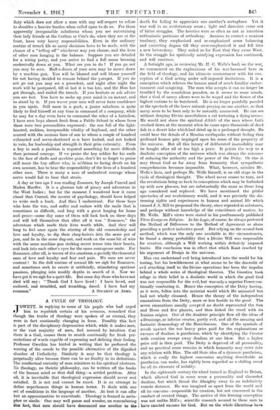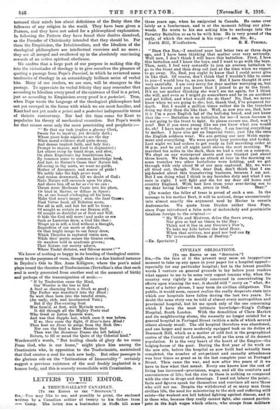A CYCLE OF THEOLOGY.
JOWETT, in replying to some of his pupils who had urged
him to republish certain of his sermons, remarked that though the truths of theology were spoken of as eternal, they were in fact continually changing in form. Possibly this fact is part of the disciplinary dispensation which, while it makes men, or the vast majority of men, feel assured by intuition that there is a God, causes them to search continually for fresh per- mutations of words capable of expressing and defining their feeling. Professor Gwatkin has hinted in writing that he preferred the warring of the creeds to the possible alternative of the dignified slumber of Catholicity. Similarly it may be that theology is perpetually alive because there can be no finality in its definitions. The intellectual curiosity of man ministers to his spiritual alertness. No theology, no theistic philosophy, can be written off the books of the human mind as that dull thing—a settled problem. After all, it is inevitable that theological expression should never rest satisfied. It is not and cannot be exact. It is an attempt to define superhuman things in human terms. It deals with one set of conditions in the language of another. At best it can offer but an approximation to exactitude. Theology is framed in meta- phor or simile. One may well pause and wonder, on remembering this fact, that men should have denounced one another to the death for failing to appreciate one another's metaphors. Yet it was well in an evolutionary sense ; light and direction came out of bitter struggles. The heretics were as often as not in intention enthusiastic partisans of orthodoxy. Anxious to correct a noxious tendency, they emphasized and re-emphasized some balancing and correcting dogma till they over-emphasized it and fell into a new hetercdoxy. They sailed so far East that they came West. So the struggle for spiritually satisfying expression has continued, and will continue.
A fortnight ago, in reviewing Mr. H. G. Wells's book on the war, wo commented on the explorations of his war-harassed hero in the field of theology, and his ultimate contentment with his con- ception of a God acting under self-imposed limitations. It is a conception which relieves the human mind of much familiar embar- rassment and misgiving. The man who accepts it can no longer be troubled by the scandalous paradox, as it seems to some minds. that a God of mercy allows wars to be waged and the flower of the highest nations to be butchered. He is no longer painfully puzzled at the spectacle of the lower animals preying on one another, so that many seem to be born only to be instantly massacred. He can see without denying Divine mercifulness a cat torturing a dying mouse. He would not share the spiritual &bade of the man whose faith crashed down at the moment when he came upon thousands of dead fish in a desert lake which had dried up in a prolonged drought. He could hear the details of a Messina earthquake without fooling that profound human pity impinged upon his sense of the propriety of the universe. But all this luxury of deliberated insensibility may be bought after all at too high a price. It points the way to a dualistic conception of the universe which was always the outcome of reducing the authority and the power of the Deity. Or else it may thrust God so far away from humanity that sympathetio comprehension becomes impossible. What, however, satisfies Mr. Wells's hero, and perhaps Mr. Wells himself, is an old stage in the cycle of theological thought. The wheel never ceases to turn, and the revolutions bring us back to conceptions which may be furbished up with new phrases, but are substantially the same as those long ago considered and replaced. We have mentioned the pitiful spectacle of our evolutionary world, and it was precisely the dis- tressing sights and experiences in human and animal life which caused J. S. Mill to propound the theory, since repeated in substance, and perhaps without knowledge of the coincidence of motive, by Mr. Wells. Mill's views were stated in his posthumously published Three Essays on Religion. In his Logic, of course, he always preferred the Method of Difference to the Method of Agreement as alone providing a perfect inductive proof. But relying on the second-beat method, which was the only one available in the circumstances, he found a strong probability that a Divine Will was responsible for creation, although a Will working within definitely imposed limits. His conclusion was in effect that which Kant reached by his argument of Design in the universe.
Man can understand evil being introduced into the world for his testing, but his bewilderment at what seems to be the discredit of evil attaching itself to the Divine operations has been the impulse behind a whole series of theological theories. The Gnostics took refuge in their belief- in a dualistic world in which the good God was not responsible for the evil, but was only a superior Power con- tinually combating it. Hence the conception of the Deity having, as it were, fallen into the material world which He animated but had not wholly cleansed. Hence the theory of the independent emanations from the Deity, more or less hostile to the good. The seven emanations usually accepted no doubt represented the Sun and Moon and five planets, and thus linked the creed with its Iranian origins. Out of the dualistic principle flow all the ideas of a Demiurge, or inferior creator, partly evil, and all the amazing and fantastic demonology of the Manichaeans. One of the symbols of revolt against the too heavy price paid for the explanations or excuses of dualism is pantheism, which by identifying the Creator with creation sweeps away dualism at one blow. But a higher price still is then paid. The Deity is deprived of all personality, and no practical sense remains in which humanity may enter into any relation with Him. The old Stoic idea of a dynamic pantheism, which is really the highest concession anything describable as pantheism can make, has rightly been regarded as a chilling creed for all its elements of nobility.
In the eighteenth century the wheel turned in England to Deism, which allowed God in some sense a personality and discarded dualism, but which thrust the Almighty away to an indefinitely remote distance. He was imagined as apart from the world and all its concerns—responsible for creation, but not concerned in the conduct of created things. The motive of this freezing conception was not unlike Mill's ; scientific research seemed to these men to have exacted excuses for God. But on the whole Christiales have
tortured their minds less about definitions of the Deity than the followers of any religion in the world. They have been given a Pattern, and they have not asked for a philosophical explanation. In following the Pattern they have found their doubts dissolved, as the Founder of Christianity intended that they should be. For them the Empiricism, the Intuitionalism, and the Idealism of the theological philosophers are intellectual exercises and no more ; they are all merged and swallowed up in the absolutely convincing rewards of an active spiritual obedience.
Wo confdss that a large part of our purpose in making this dip into the vicissitudes of theology is to give ourselves the pleasure of quoting a passage from Pope's Dunciad, in which he reviewed some tendencies of theology in an astonishingly brilliant series of verbal hits. Many of our readers, we are sure, will be strangers to the passage. To appreciate its verbal felicity they may remember that according to Idealism every proof of the existence of God is a priori, just as according to Empiricism every proof is a posteriori. True, when Pope wrote the language of the theological philosophers had not yet emerged in the forms with which we are most familiar, and Kant had not yet made a priori and a posteriori indispensable terms of theistic controversy. Nor had the time coma for Kant to popularize his theory of mechanical causation. But Pope's words for that reason seem only the more penetrating and prophetic :- "' Be that my task (replies a gloomy Clerk, Sworn foe to myst'ry, yet divinely dark ; Whose pious hope aspires to see the day When moral evidence shall quite decay, And damns implicit faith, and holy lies ;
Prompt to impose, and fond to dogmatize) :
Let others creep by timid steps, and slow, On plain Experience lay foundations low, By common sense to common knowledge bred,
And last, to Nature's Cause thro' Nature led.
All-seeing in thy mists, we want no guide, Mother of Arrogance, and source of pride ! We nobly take the high priori road, And reason downward, till we doubt of God : Make Nature still encroach upon his plan, And shove him off as far as e'er we can : Thrust some Mechanic Cause into his place, Or bind in Matter, or diffuse in Space: Or, at one bound o'erleaping all his laws,
Make God man's image ; man, the final Cause:
Find Virtue local, all Relation soon:, See all in self, and but for self be born : Of nought so certain as our Reason still, Of nought so doubtful as of Soul and Will.
O hide the God still more ! and make us see Such as Lucretius drew, a God like thee : Wrapt up in self, a God without a thought, Regardless of our merit or default.
Or that bright image to our fancy draw, Which Theocles in raptured vision saw, While thro' poetic scenes the Genius roves, Or wanders wild in academic groves; That Nature our society adores, Whore Tindal dictates, and Silenus snores !' " We know of nothing so happy in its bending of theological contro- versy to the purposes of verse, though there is a fine kindred instance In Dryden's Ode to Mrs. Anne Killigrew, where the poet's mind plays round the theories of Traducianism (Tertullian's idea that each soul is newly generated from another soul at the moment of birth) and perhaps of the transmigration of souls :- " If by Traduction came thy Mind, Our Wonder is the less to find A Soul so charming from a Stock so good ; Thy Father was tro.nsfued into thy Blood : So wart thou born into the tuneful strain, (An early, rich, and inexhausted Vein.) But if thy Prre-existing Soul Was form'd, at first, with Myriads more, It did through all the Mighty Poets rout Who Greek or Latine Laurels wore, And was that Sappho last, whit* once it was before.
If so, then cease thy flight, 0 Heav'n-born Mind I Thou haat no Dross to purge from thy Rich Ore : Nor can thy Soul a fairer Mansion find Than was the Beauteous Frame she left behind : Return, to fill or mend the Quire of thy Celestial kind."
Wordsworth's words, " But trailing clouds of glory do we come From God, who is our home," might place him among the Creatianists who, in opposition to the Traducianists, maintained that God creates a soul for each new body. But other passages in the glorious ode on the "Intimations of Immortality " certainly suggest a previous existence of the soul freshly implanted in a human body, and this is scarcely reconcilable with Creationism.















































 Previous page
Previous page